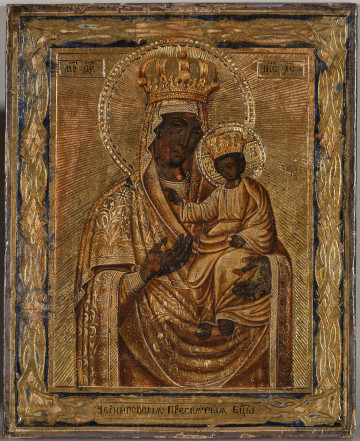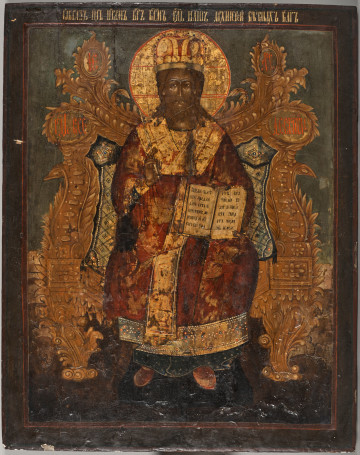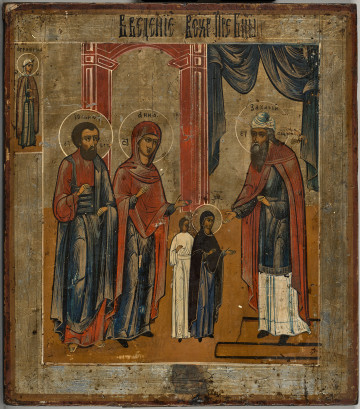
The Mother of God of Hodigitria
19th (?) century
Castle Museum in Łańcut
Part of the collection: Ikony
The well-developed cult of St. Nicholas in Rus contributed to the popularisation of his depictions. Icons of St. Nicholas were placed in temples and private homes. In the form of small-sized casts, they were also readily worn on one's person, see S.12796MŁ, S.12805MŁ, S.12836MŁ, S.12866MŁ. This type of personal icons were used and made mainly by Old Ritualists, also known as Old Believers. They staunchly stood by the old Rus Church tradition and thus, were persecuted by the state and by the official Moscow Orthodox Church, reformed by Patriarch Nikon in the 17th c. Convenient to use and relatively inexpensive cast images were also popular among the followers of the official Orthodox Church; the models developed by Old Ritualists were reproduced and imitated in large quantities. In the presented icon, Nicholas the Wonderworker is revered by the figures of the saint reformers of monastic life, Basil the Great and Sergius of Radonezh, who are placed on both his sides, see also S.12796MŁ. They were particularly revered among the Old Ritualists. Basil the Great, Bishop of Caesarea in Cappadocia and one of the Church Fathers, lived in the 4th c. Himself a hermit, and then monk, St. Basil contributed to the development of monastic life and defined its rules. He was also the author of the liturgy of the Eucharist, performed in Eastern Orthodox churches to this day. Sergius of Radonezh lived in the 14th c. and worked to revitalise monastic life in Rus while the country was recovering from collapse after the Mongol invasion. Sergius, considered the spiritual guardian of Rus, blessed Dmitry Donskoy, who defeated the Golden Horde in 1380. After becoming a monk, Sergius established the Trinity Lavra monastery in the wasteland located around 70 km northeast of Moscow. The monastery became a model of monastic life.
Dimensions
height: 6.5 cm, width: 5.5 cm
Object type
Icons
Technique
cast
Material
brass
Origin / acquisition method
decyzja administracyjna
Creation time / dating
Creation / finding place
Owner
Castle Museum in Łańcut
Identification number
Location / status

19th (?) century
Castle Museum in Łańcut

1800 — 1850
Castle Museum in Łańcut

1800 — 1899
Castle Museum in Łańcut
DISCOVER this TOPIC
Museum of King Jan III's Palace at Wilanów
DISCOVER this PATH
Educational path